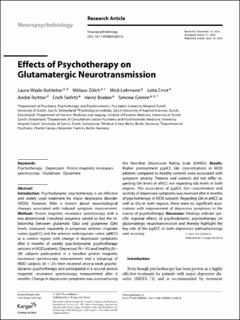Please use this identifier to cite or link to this item:
https://doi.org/10.21256/zhaw-28453Full metadata record
| DC Field | Value | Language |
|---|---|---|
| dc.contributor.author | Wade-Bohleber, Laura | - |
| dc.contributor.author | Zoelch, Niklaus | - |
| dc.contributor.author | Lehmann, Mick | - |
| dc.contributor.author | Ernst, Jutta | - |
| dc.contributor.author | Richter, André | - |
| dc.contributor.author | Seifritz, Erich | - |
| dc.contributor.author | Boeker, Heinz | - |
| dc.contributor.author | Grimm, Simone | - |
| dc.date.accessioned | 2023-08-11T14:29:48Z | - |
| dc.date.available | 2023-08-11T14:29:48Z | - |
| dc.date.issued | 2023-06-15 | - |
| dc.identifier.issn | 0302-282X | de_CH |
| dc.identifier.issn | 1423-0224 | de_CH |
| dc.identifier.uri | https://digitalcollection.zhaw.ch/handle/11475/28453 | - |
| dc.description.abstract | Introduction: Psychodynamic psychotherapy is an effective and widely used treatment for major depressive disorder (MDD); however, little is known about neurobiological changes associated with induced symptom improvement. Methods: Proton magnetic resonance spectroscopy with a two-dimensional J-resolved sequence served to test the relationship between glutamate (Glu) and glutamine (Gln) levels, measured separately in pregenual anterior cingulate cortex (pgACC) and the anterior midcingulate cortex (aMCC) as a control region, with change in depression symptoms after 6 months of weekly psychodynamic psychotherapy sessions in MDD patients. Depressed (N = 45) and healthy (N = 30) subjects participated in a baseline proton magnetic resonance spectroscopy measurement and a subgroup of MDD subjects (N = 21) then received once-a-week psychodynamic psychotherapy and participated in a second proton magnetic resonance spectroscopy measurement after 6 months. Change in depression symptoms was assessed using the Hamilton Depression Rating Scale (HAMD). Results: Higher pretreatment pgACC Gln concentrations in MDD patients compared to healthy controls were associated with symptom severity. Patients and controls did not differ regarding Gln levels in aMCC nor regarding Glu levels in both regions. The association of pgACC Gln concentration and severity of depressive symptoms was reversed after 6 months of psychotherapy in MDD subjects. Regarding Gln in aMCC as well as Glu in both regions, there were no significant associations with improvement of depressive symptoms in the course of psychotherapy. Discussion: Findings indicate specific regional effects of psychodynamic psychotherapy on glutamatergic neurotransmission and thereby highlight the key role of the pgACC in both depression pathophysiology and recovery. | de_CH |
| dc.language.iso | en | de_CH |
| dc.publisher | Karger | de_CH |
| dc.relation.ispartof | Neuropsychobiology | de_CH |
| dc.rights | https://creativecommons.org/licenses/by/4.0/ | de_CH |
| dc.subject | Depression | de_CH |
| dc.subject | Glutamate | de_CH |
| dc.subject | Glutamine | de_CH |
| dc.subject | Proton magnetic resonance spectroscopy | de_CH |
| dc.subject | Psychotherapy | de_CH |
| dc.subject.ddc | 616.89: Psychische Störungen, klinische Psychologie und Psychiatrie | de_CH |
| dc.title | Effects of psychotherapy on glutamatergic neurotransmission | de_CH |
| dc.type | Beitrag in wissenschaftlicher Zeitschrift | de_CH |
| dcterms.type | Text | de_CH |
| zhaw.departement | Angewandte Psychologie | de_CH |
| zhaw.organisationalunit | Psychologisches Institut (PI) | de_CH |
| dc.identifier.doi | 10.1159/000530312 | de_CH |
| dc.identifier.doi | 10.21256/zhaw-28453 | - |
| dc.identifier.pmid | 37321187 | de_CH |
| zhaw.funding.eu | No | de_CH |
| zhaw.issue | 4 | de_CH |
| zhaw.originated.zhaw | Yes | de_CH |
| zhaw.pages.end | 209 | de_CH |
| zhaw.pages.start | 203 | de_CH |
| zhaw.publication.status | publishedVersion | de_CH |
| zhaw.volume | 82 | de_CH |
| zhaw.publication.review | Peer review (Publikation) | de_CH |
| zhaw.author.additional | No | de_CH |
| zhaw.display.portrait | Yes | de_CH |
| zhaw.relation.references | https://doi.org/10.48573/kfpv-pt95 | de_CH |
| Appears in collections: | Publikationen Angewandte Psychologie | |
Files in This Item:
| File | Description | Size | Format | |
|---|---|---|---|---|
| 2023_WadeBohleber-etal_Effects-of-psychotherapy-on-glutamatergic-neurotransmission.pdf | 669.41 kB | Adobe PDF |  View/Open |
Show simple item record
Wade-Bohleber, L., Zoelch, N., Lehmann, M., Ernst, J., Richter, A., Seifritz, E., Boeker, H., & Grimm, S. (2023). Effects of psychotherapy on glutamatergic neurotransmission. Neuropsychobiology, 82(4), 203–209. https://doi.org/10.1159/000530312
Wade-Bohleber, L. et al. (2023) ‘Effects of psychotherapy on glutamatergic neurotransmission’, Neuropsychobiology, 82(4), pp. 203–209. Available at: https://doi.org/10.1159/000530312.
L. Wade-Bohleber et al., “Effects of psychotherapy on glutamatergic neurotransmission,” Neuropsychobiology, vol. 82, no. 4, pp. 203–209, Jun. 2023, doi: 10.1159/000530312.
WADE-BOHLEBER, Laura, Niklaus ZOELCH, Mick LEHMANN, Jutta ERNST, André RICHTER, Erich SEIFRITZ, Heinz BOEKER und Simone GRIMM, 2023. Effects of psychotherapy on glutamatergic neurotransmission. Neuropsychobiology. 15 Juni 2023. Bd. 82, Nr. 4, S. 203–209. DOI 10.1159/000530312
Wade-Bohleber, Laura, Niklaus Zoelch, Mick Lehmann, Jutta Ernst, André Richter, Erich Seifritz, Heinz Boeker, and Simone Grimm. 2023. “Effects of Psychotherapy on Glutamatergic Neurotransmission.” Neuropsychobiology 82 (4): 203–9. https://doi.org/10.1159/000530312.
Wade-Bohleber, Laura, et al. “Effects of Psychotherapy on Glutamatergic Neurotransmission.” Neuropsychobiology, vol. 82, no. 4, June 2023, pp. 203–9, https://doi.org/10.1159/000530312.
Items in DSpace are protected by copyright, with all rights reserved, unless otherwise indicated.